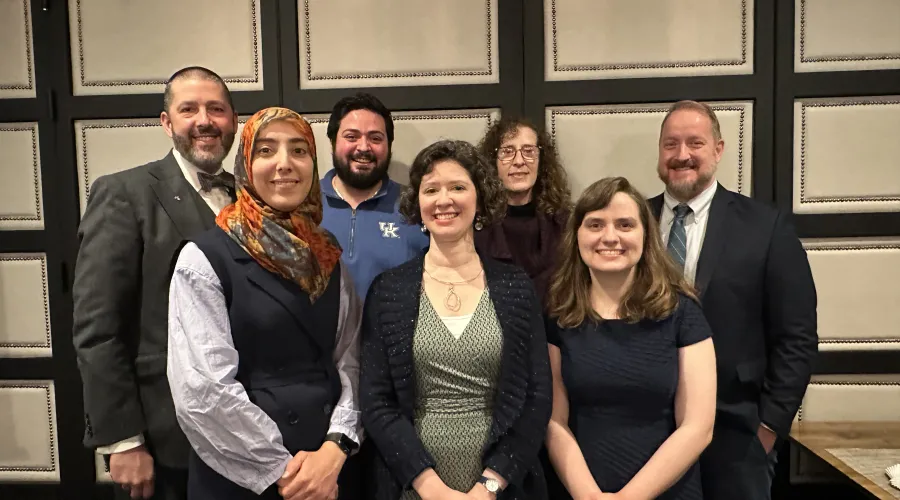
Research
Research in Otolaryngology
The University of Kentucky Department of Otolaryngology believes that research is a critical aspect of patient outcomes and advances in patient care, as well as medical education. UK Otolaryngology has NIH and RO1 funding, and is a leader in hearing care disparities research. The department is also actively involved in COVID research, both in the clinical trials and educational realms. We invite you to explore the links to highlighted research areas below:
CHAMPS-DHH
CHAMPS-DHH is a research study that focuses on building better support for families with kids who are deaf and hard of hearing and use hearing devices! Funding: $1,525,000 (subaward from University of Colorado)
CHAMPS-DHH
CHAMPS-DHH is a research study that focuses on building better support for families with kids who are deaf and hard of hearing and use hearing devices! Funding: $1,525,000 (subaward from University of Colorado)
AppSTAR
The University of Kentucky has partnered with the University of Arkansas for Medical Sciences (UAMS) and Duke University to bring an enhanced school hearing screening program to 14 different school districts throughout Eastern Kentucky. The study is called the Appalachian STAR Trial (AppSTAR). “STAR” stands for Specialty Telemedicine Access for Referrals. Funding: $5,143,363.00
AppSTAR
The University of Kentucky has partnered with the University of Arkansas for Medical Sciences (UAMS) and Duke University to bring an enhanced school hearing screening program to 14 different school districts throughout Eastern Kentucky. The study is called the Appalachian STAR Trial (AppSTAR). “STAR” stands for Specialty Telemedicine Access for Referrals. Funding: $5,143,363.00
HHARC
HHARC (Hearing Healthcare Assessment in Rural Communities) looks to test the rural hearing health care patient navigation program. Adults living in rural areas face a higher risk of experiencing hearing loss, and more difficulty receiving testing and treatment than adults in urban settings. The goal of this clinical trial is to develop and test a community-based hearing healthcare patient navigation program in rural Kentucky. The main question this study aims to answer is: can the number of rural adults receiving diagnostic hearing tests be increased? Funding: $418,416.00
HHARC
HHARC (Hearing Healthcare Assessment in Rural Communities) looks to test the rural hearing health care patient navigation program. Adults living in rural areas face a higher risk of experiencing hearing loss, and more difficulty receiving testing and treatment than adults in urban settings. The goal of this clinical trial is to develop and test a community-based hearing healthcare patient navigation program in rural Kentucky. The main question this study aims to answer is: can the number of rural adults receiving diagnostic hearing tests be increased? Funding: $418,416.00
CHHIRP
Started in 2019, CHHIRP (which stands for Communities Helping the Hearing of Infants by Reaching Parents) aims to help aid in timely hearing loss care. This research employs a new method for helping children with hearing loss receive timely care by using a patient navigator, who is someone who teaches and provides emotional/social support for the families of these children. Funding: $3,103,843.00
CHHIRP
Started in 2019, CHHIRP (which stands for Communities Helping the Hearing of Infants by Reaching Parents) aims to help aid in timely hearing loss care. This research employs a new method for helping children with hearing loss receive timely care by using a patient navigator, who is someone who teaches and provides emotional/social support for the families of these children. Funding: $3,103,843.00
Cochlear Implant (CI)
Quality of life, physical activity, and patient oriented outcomes after cochlear implantation and hearing amplification in Appalachian populations. Department funded.
Cochlear Implant (CI)
Quality of life, physical activity, and patient oriented outcomes after cochlear implantation and hearing amplification in Appalachian populations. Department funded.
Resident Research
In addition to the aforementioned clinical trials, the University of Kentucky Department of Otolaryngology Residency Program believes that research is a key component of developing clinicians and lifelong inquisitiveness. Residents spend 2 months of their PGY-3 year on research block, and 1 month of their PGY-4 year. Residents are taught research process and are expected to complete at least two projects of publishable quality by the end of residency. Most of our residents complete more than these minimums. Travel funds are provided for accepted presentations as regional and/or national meetings.
The residency program requires residents to design, complete, and submit two research projects for publication in an academic journal of their choosing. Residents may research any topic of interest, retrospective, prospective or basic science in nature. We have full-time research faculty and receive NIH funding. A list of recent resident research can be found here.
Resident Research
In addition to the aforementioned clinical trials, the University of Kentucky Department of Otolaryngology Residency Program believes that research is a key component of developing clinicians and lifelong inquisitiveness. Residents spend 2 months of their PGY-3 year on research block, and 1 month of their PGY-4 year. Residents are taught research process and are expected to complete at least two projects of publishable quality by the end of residency. Most of our residents complete more than these minimums. Travel funds are provided for accepted presentations as regional and/or national meetings.
The residency program requires residents to design, complete, and submit two research projects for publication in an academic journal of their choosing. Residents may research any topic of interest, retrospective, prospective or basic science in nature. We have full-time research faculty and receive NIH funding. A list of recent resident research can be found here.
Student Research Inquiries
Please provide your information, and the research manager will contact you soon.
Student Research Inquiries
Please provide your information, and the research manager will contact you soon.